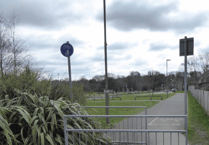There were fewer motorists convicted of speeding offences in Hampshire last year, new figures show – in contrast to a record national high.
The RAC Foundation said the rise in convictions across England and Wales makes for "grim reading" as speeding plays a significant part in road collisions.
Figures from the Ministry of Justice show 2,930 motorists caught by Hampshire Constabulary were convicted in courts for speeding offences in 2022.
It was down 10% from 3,244 convictions the year before.
Overall, 78% of the 3,772 motorists in Hampshire who had court proceedings for speeding ended up being convicted of the offence.
Most people caught speeding are handed a £100 fine and either penalty points or invited to participate in a retraining course.
But cases involving serious incidents or motorists denying exceeding the limit often end up in court, where fines can reach a maximum of £2,500 for speeding on a motorway.
RAC road safety spokesperson Simon Williams said: "The fact the number of court convictions has risen in just a year seems to imply an increase in the proportion of serious cases having to be dealt with in legal proceedings."
"While it is clearly wrong to be just a few miles an hour over the limit, arguably it is prolific excessive speeders who are putting people’s lives in danger. An increase in these drivers will have frightening consequences for the safety of our roads," he said.
He added while it is positive to see drivers are being caught for breaking speed limits, it would be better if they just stuck them.
Across England and Wales, 236,480 motorists were convicted in court for exceeding the speed limit in 2022. It was a 16% rise from 203,545 the year prior and was the highest since at least 2014.
Yet in Hampshire, 2015 marked the highest number of speeding convictions in the past eight years when 6,118 successful proceedings were made against motorists.
Nicholas Mantel, head of Churchill Motor Insurance, said: "Speeding is one of the main causes of road accidents and our research suggests that the problem is getting worse."
"Many drivers accidentally creep above the limit rather than speeding deliberately," he added.
"While most people receive a fixed penalty notice for speeding, more serious or contested cases end up in court. This data shows that drivers who appear in court for speeding are usually convicted, and the fines are deservedly steep."




